Where does my personality fit in?
- Published
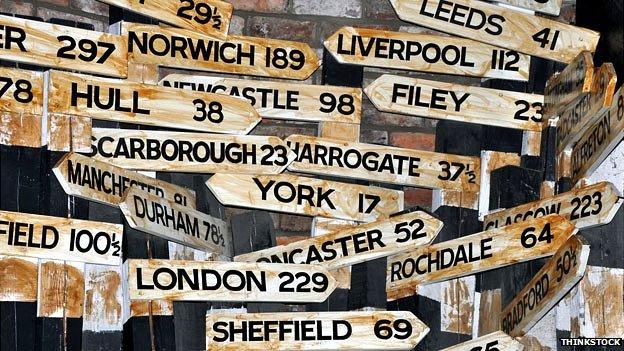
New research maps the personality of 380 places in Great Britain. Where do you fit in?
From the pushy Londoner to the dour Scot, stereotypes about different personalities across Britain have been a feature of national life and the butt of countless jokes for centuries.
So is there anything to learn from the largest study ever , externalconducted into the psychological landscape of the country? Are any of the old cliches remotely true?
The online survey was conducted over two years and nearly 400,000 people took part, covering the 380 local authority areas of England, Wales and Scotland. The project was conducted by Cambridge University and the BBC's Lab UK project, with the results published in the journal PLOS ONE.
Out of the 100 questions people completed, 44 were designed to rank their personalities according to five well-established personality traits: extroversion, agreeableness, conscientiousness, neuroticism and openness.
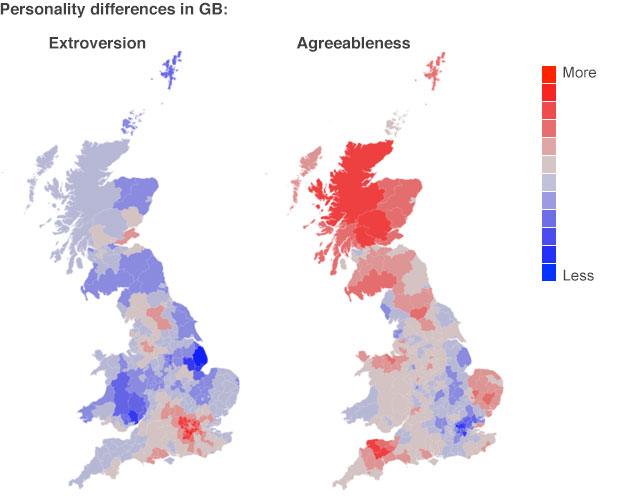
Nothing on this scale has ever been attempted before and for the first time it allowed researchers to take the results from an unusually large sample and plot them to produce a series of personality maps.
A note of caution before getting to the findings of the Big Personality Test - everyone who took part was self-selecting and also had access to the internet. These factors clearly limit the range of people included in the survey. In a handful of districts the response was too small to be reliable, which is why Northern Ireland was excluded.
People from across the UK describe the personalities of the people who live in their region.
So what do the results show? There are quite striking patterns, some predictable, others less so.
No surprise that London comes out very high for people who are extroverts - which means they are social and energetic - along with those in parts of south and south-east England, Yorkshire, Manchester and areas of Scotland.
By contrast, rather the opposite is seen in the east Midlands, Wales, Humberside, the North of England, and areas in east Scotland, where personalities are seen to be "quiet, reserved, and introverted", according to the survey.

Take the test: Where in Britain would you be happiest?
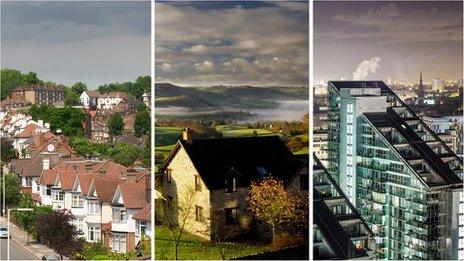
Do you fit in with the personality of your area? Could there be somewhere in Britain that suits you better?

Next, agreeableness. It ranks very highly throughout most of Scotland, as well as areas in the North, South West, and East of England. The paper, describing the findings, says this means more residents than average are "friendly, trusting and kind".
I found that out for myself when talking to people in the small town of Doune, in the pretty rolling countryside near Stirling. Everyone was polite and happy to be interviewed, even in a bitterly cold wind. If they were in a hurry to collect their children from school they were very apologetic.
One elderly woman said local people looked "after one another... the type that pass you in the street and if you don't know them they still say hello to you".
The survey finds the opposite - with low levels of agreeableness - in London and various parts of eastern England. The paper suggests "that comparatively large proportions of residents of these areas were uncooperative, quarrelsome, and irritable". This may ring true to anyone who is familiar with a crowded Tube train.
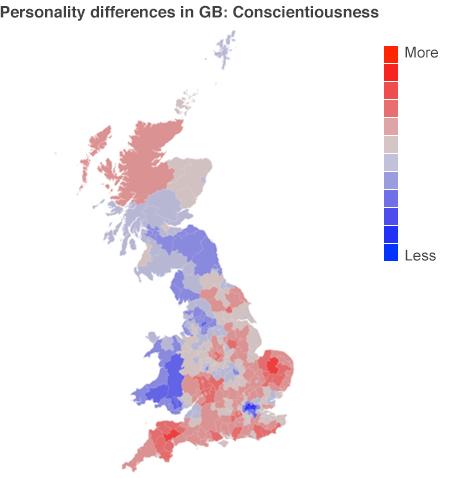
The map for conscientiousness tells another story. There are high levels of this trait in much of southern England, pockets of the Midlands, and the Scottish Highlands. While in London, Wales, and parts of the North of England, there is a lower rank for conscientiousness, meaning people may be more rebellious or indifferent.
More sensitive is the question of how neuroticism features across the map of Britain. "Significantly high levels of neuroticism appeared throughout most of Wales and in a number of districts throughout the Midlands," according to the paper. It suggests large proportions of residents in these areas were "comparatively anxious, depressed, and temperamental".
In my own experience, one sunny lunchtime in Pontypridd in the South Wales valleys, it was striking how some people were either in no mood to talk or were openly rude about their town.

Places and their personalities
Open: Hackney - Not so: Maldon, Essex
Conscientious: Isles of Scilly - Not so: Manchester
Extrovert: Hammersmith and Fulham: - Not: Boston, Lincolnshire
Agreeable: Isles of Scilly - Not so: City of London
Neurotic: Boston, Lincolnshire - Not so: Orkney
Source: Regional Personality differences in Great Britain

When neuroticism was measured in the South West, much of southern England and most of Scotland, people were found to be more "calm, relaxed, and emotionally stable" than the national average.
Finally, openness. In this context it means people who are creative and curious, and urban areas like London, Oxford, Cambridge, Brighton, Bristol, Manchester, Glasgow, and parts of Wales score very highly. Much lower levels of openness are seen in the East Midlands and the East of England.
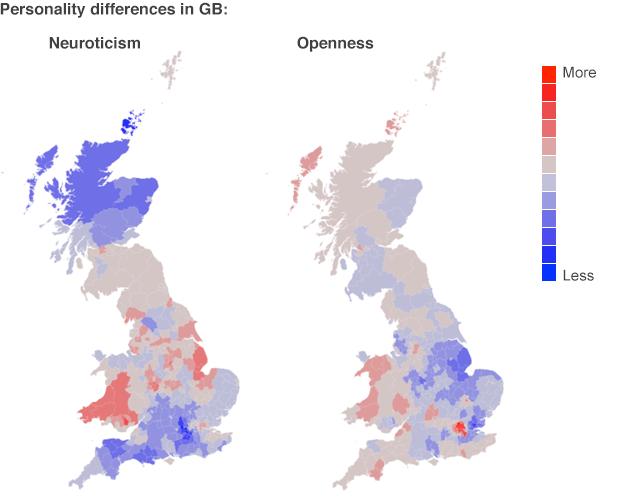
The lead researcher on the project, Dr Jason Rentfrow, of Cambridge University, is keen to stress that not too much detail should be read into the results.
"I wouldn't move house on the basis of this survey," he says. Clearly, on top of people's need to find work and schools and affordable housing, the character of a district may be a decisive factor, but not the only one.
However, he says the broad trends are revealing about a relationship between geography and personality They also chime with earlier studies of his in the US.
There, Rentfrow found that residents of New England, the mid-Atlantic coast, and the Pacific coast scored higher on openness than people in the Great Plains and other heartland regions, rather like the distinction found in the survey between innovators in Britain's big cities and more traditional people in rural areas.
Another similarity comes with the measure of agreeableness, which is high in the wide open spaces of America's central Great Plains and South, as it is in the Scottish Highlands and North of England.

What are the "Big Five"?
The Big Personality Test worked out people's "Big Five" traits. These are widely recognised and well-used scientific measure of personality.
Openness - To what extent you are receptive to novel ideas, creative experiences and different values
Conscientiousness - To what extent you are organised and exhibit self-control
Extroversion - To what extent you are inclined to experience positive emotions and how attracted you are to social, stimulating experiences
Agreeableness - To what extent you are concerned about the feelings of others and how easily you form bonds with people
Neuroticism - To what extent you react to perceived threats and stressful situations

Rentfrow suggests a further parallel may be possible - to do with the temperature. In the relative warmth of the US West Coast and the South West of England, the score for neuroticism is below the national average.
So what does this study tell us? Although in some cases, it seems to lend support to several old stereotypes, it also provides the first factual basis for mapping personality types across the country.
It opens the way to a couple of fascinating questions. Are people the way they are because of the characteristics of their regions - for example the attractiveness of their surroundings or the state of the local economy? Or are people with certain traits drawn to particular areas? Or a bit of both?
And understanding this might conceivably have a bearing on how companies shape their marketing or how the government targets its financial support for different regions. And it may also catch the professional eye of another set of people - the political parties.
Additional reporting by Denise Winterman
Subscribe to the BBC News Magazine's email newsletter to get articles sent to your inbox.